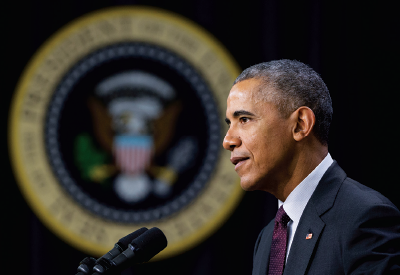President Barack Obama in January issued a ban on the use of solitary confinement for juvenile and low-level offenders in federal prisons, citing the potential for “devastating, lasting psychological consequences” from the use of isolation as punishment.
Solitary confinement “has been linked to depression, alienation, withdrawal, a reduced ability to interact with others, and the potential for violent behavior,” the president wrote in an op-ed in the Washington Post on January 25. “Some studies indicate that it can worsen existing mental illnesses and even trigger new ones. Prisoners in solitary are more likely to commit suicide, especially juveniles and people with mental illnesses.”
In July 2015, the president announced that he had asked Attorney General Loretta Lynch to review “the overuse of solitary confinement across American prisons.” In response, the Department of Justice (DOJ) issued a report in January setting out principles that would responsibly limit the use of restrictive housing at the federal, state, and local levels. In his op-ed, Obama noted that among the DOJ recommendations were “banning solitary confinement for juveniles and as a response to low-level infractions, expanding treatment for the mentally ill, and increasing the amount of time inmates in solitary can spend outside of their cells.”
The DOJ report states that there are occasions when correctional officials have no choice but to segregate inmates from the general population, typically when it is the only way to ensure the safety of inmates, staff, and the public.
“But as a matter of policy, we believe strongly this practice should be used rarely, applied fairly, and subjected to reasonable constraints,” the report states. “It is the responsibility of all governments to ensure that this practice is used only as necessary—and never as a default solution. But just as we must consider the impact on inmates, so too must we consider the impact on correctional staff. These public servants work hard, often for long hours and under difficult conditions, and we must protect them from unreasonable danger.”
In comments to Psychiatric News, child psychiatrist Louis Kraus, M.D., a member of the APA Council on Children, Adolescents, and Their Families, called the president’s action “a great start.”
He added, “It follows on a decision by New York state to ban solitary confinement and other state actions to progressively decrease use of solitary confinement.” But Kraus noted that many state facilities, lacking the funding to provide alternative services and activities for detained juveniles, continue to effectively isolate juveniles while using other terms—such as “protective confinement.”
“Facilities are playing shell games with solitary confinement, and until there are laws against it, it will continue. We need not just legislation but the funding that these facilities require so that kids can move out of their cells for the majority of the day and participate in other activities including full-day school, which is often lacking in juvenile facilities.”
In 2012, the American Academy of Child and Adolescent Psychiatry approved a policy statement opposing the use of solitary confinement in correctional facilities for juveniles and called for an evaluation by a mental health professional of any youth confined for more than 24 hours. Similarly, in 2014 the AMA approved a resolution saying solitary confinement is detrimental to adolescent health and should be prohibited, except for extraordinary circumstances, such as those that involve protection of the juvenile, staff, or other detainees.
Kraus said an estimated 60 percent to 70 percent of youth in detention centers have an underlying mental disorder. “The combination of a lack of mental health services in juvenile detention centers and ongoing use of solitary confinement is severely deleterious to youth.”
In the Washington Post editorial, the president said, “Reforming solitary confinement is just one part of a broader bipartisan push for criminal justice reform. Every year, we spend $80 billion to keep 2.2 million people incarcerated. Many criminals belong behind bars. But too many others, especially nonviolent drug offenders, are serving unnecessarily long sentences. That’s why members of Congress in both parties are pushing for change, from reforming sentencing laws to expanding reentry programs to give those who have paid their debt to society the tools they need to become productive members of their communities. And I hope they will send me legislation as soon as possible that makes our criminal justice system smarter, fairer, less expensive, and more effective. ■
President Obama’s editorial can be accessed
here.The AACAP statement “Solitary Confinement of Juvenile Offenders” is available
here.

